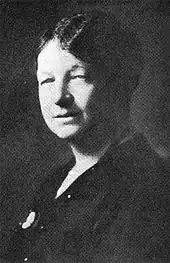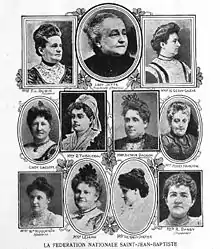Marie Lacoste Gérin-Lajoie
Marie Lacoste Gérin-Lajoie (19 October 1867 – 1 November 1945) was a Canadian feminist who co-founded the Fédération nationale Saint-Jean-Baptiste with Caroline Dessaulles-Béique (in 1907),[1] an organization which campaigned for social and political rights for women. In addition to its legal work, the Federation nationale also championed social causes such as providing milk for children and mothers, fighting alcoholism and illness, raising awareness of infant mortality, and various other issues that affected women's lives.


Personal life
Marie Lacoste was the daughter of Marie-Louise Globensky and Alexandre Lacoste.[2] She married a lawyer, Henry Gérin-Lajoie, on the condition that he give her the freedom to continue her campaign for women's rights. She was 20 when they married. The couple raised four children.
Career
In addition to her campaign for more legal rights for women, Gérin-Lajoie also played a part in arguing for French-language university education for the women of Quebec. Partly in response to her actions, the Quebec Catholic clergy agreed to open the first francophone women's college, in 1908. In 1922, Gérin-Lajoie led a protest for women's suffrage in Quebec. Quebec was the last Canadian province to grant the vote to women, in 1940.
Gérin-Lajoie was a professor at the Université de Montréal, and a self-taught legal expert (her father and husband were both lawyers, and she had access to their books). She was the author of two legal works: Traité de droit usuel, in 1902 and La femme et le code civil, in 1929. In these books, Gérin-Lajoie argued against the subordinate legal position of married women. In this time, women had no control over their own financial assets and no legal input into the financial affairs of their families. She wanted to grant more rights to married and separated women so they could control their own property, and act as legal guardians to minors. In 1929, Gérin-Lajoie testified on women's rights before the Dorion Commission. In 1931, the Quebec Civil Code was changed to reflect the changes Gérin-Lajoie had been arguing for.
She was designated a Person of National Historic Significance by the Historic Sites and Monuments Board of Canada in 1998[3]
Notes
- Cohen, Yolande (2010). "Chapitre 4. Santé publique, care et professions féminines". Femmes philanthropes: Catholiques, protestantes et juives dans les organisations caritatives au Québec (1880–1945). Montreal, Canada: University of Montreal Press. pp. 107–149. doi:10.4000/books.pum.4463. ISBN 978-2-821-89766-3.
- Pelletier-Baillargeon, Hélène (1985). Marie Gérin-Lajoie (in French). Montreal, Quebec: Boréal Express. p. 67. ISBN 978-2-89052-145-2.
- Parks Canada, Designations of national historic significance announced on Parks Day (news release), 18 July 1998; Parks Canada, Marie Gérin-Lajoie, nee Lacoste, (1867–1945) (backgrounder), 18 July 1998.
Further reading
- Marie Gérin-Lajoie, née Lacoste, at The Canadian Encyclopedia, by Margaret E. McCallum, 23 October 2015
- Merna Forster: 100 Canadian Heroines. Famous and Forgotten Faces.. Dundurn, Toronto ON 2004 ISBN 9781550025149 online at Google books
- Marie Lacoste Gérin-Lajoie at Library and Archives Canada
- Anne-Marie Sicotte: Marie Gérin-Lajoie: Conquérante de la Liberté. Montreal: Remue-ménage, 2005 [in French]; with bibliography
- Lacoste, at Dictionary of Canadian Biography, vol. 17, by Anne-Marie Sicotte (bibliography)